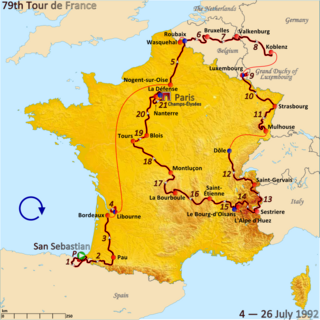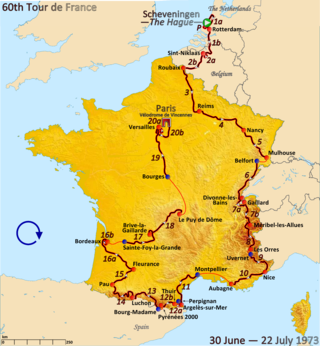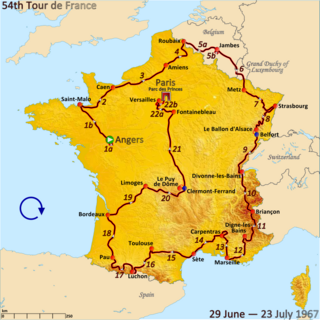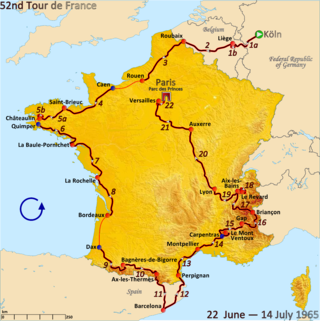
The 2001 Tour de France was a multiple-stage bicycle race held from 7 to 29 July, and the 88th edition of the Tour de France. It has no overall winner—although American cyclist Lance Armstrong originally won the event, the United States Anti-Doping Agency announced in August 2012 that they had disqualified Armstrong from all his results since 1998, including his seven Tour de France wins from 1999 to 2005. The verdict was subsequently confirmed by the Union Cycliste Internationale.

The 2002 Tour de France was a multiple-stage bicycle race held from 6 to 28 July, and the 89th edition of the Tour de France. The event started in Luxembourg and ended in Paris. The Tour circled France counter-clockwise, visiting the Pyrenees before the Alps. It has no overall winner—although American cyclist Lance Armstrong originally won the event, the United States Anti-Doping Agency announced in August 2012 that they had disqualified Armstrong from all his results since 1998, including his seven Tour de France wins from 1999 to 2005; the Union Cycliste Internationale confirmed the result.

The 2003 Tour de France was a multiple stage bicycle race held from 5 to 27 July, and the 90th edition of the Tour de France. It has no overall winner—although American cyclist Lance Armstrong originally won the event, the United States Anti-Doping Agency announced in August 2012 that they had disqualified Armstrong from all his results since 1998, including his seven Tour de France wins from 1999 to 2005; the Union Cycliste Internationale has confirmed this verdict.

The 2004 Tour de France was a multiple stage bicycle race held from 3 to 25 July, and the 91st edition of the Tour de France. It has no overall winner—although American cyclist Lance Armstrong originally won the event, the United States Anti-Doping Agency announced in August 2012 that they had disqualified Armstrong from all his results since 1998, including his seven Tour de France wins from 1999 to 2005; the Union Cycliste Internationale confirmed the result.

The 2005 Tour de France was the 92nd edition of the Tour de France, one of cycling's Grand Tours. It took place between 2–24 July, with 21 stages covering a distance 3,593 km (2,233 mi). It has no overall winner—although American cyclist Lance Armstrong originally won the event, the United States Anti-Doping Agency announced on 24 August 2012 that they had disqualified Armstrong from all his results since 1 August 1998, including his seven Tour de France wins from 1999 to 2005. The verdict was subsequently confirmed by the UCI.

The 1998 Tour de France was the 85th edition of the Tour de France, one of cycling's Grand Tours. The 3,875 km (2,408 mi) race was composed of 21 stages and a prologue. It started on 11 July in Ireland before taking an anti-clockwise route through France to finish in Paris on 2 August. Marco Pantani of Mercatone Uno–Bianchi won the overall general classification, with Team Telekom's Jan Ullrich, the defending champion, and Cofidis rider Bobby Julich finishing on the podium in second and third respectively.

The 2000 Tour de France was a multiple stage bicycle race held from 1 to 23 July, and the 87th edition of the Tour de France. There was no overall winner following a vacating of results by the United States Anti-Doping Agency announcement on 24 August 2012 that they had disqualified Lance Armstrong from all his results since 1 August 1998, including his seven Tour de France wins from 1999 to 2005; the Union Cycliste Internationale confirmed the result.

The 1995 Tour de France was the 82nd Tour de France, taking place from 1 to 23 July. It was Miguel Induráin's fifth and final victory in the Tour. On the fifteenth stage Italian rider Fabio Casartelli died after an accident on the Col de Portet d'Aspet.

The 1996 Tour de France was the 83rd edition of the Tour de France, starting on 29 June and ending on 21 July, featuring 19 regular stages, 2 individual time trials, a prologue and a rest day. It was won by Danish rider Bjarne Riis.

The 1997 Tour de France was the 84th edition of the Tour de France and took place from 5 to 27 July. Jan Ullrich's victory margin of 9:09 was the largest margin of victory since Laurent Fignon won the 1984 Tour de France by 10:32. Since 1997 no rider has had this convincing of a win with the closest margin to Ullrich's victory being Vincenzo Nibali winning the 2014 Tour de France with a gap of 7:39. Ullrich's simultaneous victories in both the general classification and the young riders' classification marked the first time the same rider had won both categories in the same Tour since Laurent Fignon in 1983. The points classification was won by Ullrich's teammate Erik Zabel, for the second time, and their team Team Telekom also won the team classification. The mountains classification was won by Richard Virenque for the fourth time.

The 1988 Tour de France was the 75th edition of the Tour de France, taking place from 4 to 24 July. It consisted of 22 stages over 3,286 km (2,042 mi). The race was won by Pedro Delgado with the top three positions at the end of the race being occupied by specialist climbers. This Tour was nearly 1,000 km shorter than the previous few editions, which were over 4,000 km, but by no means easier as it included five consecutive mountain stages including a mountain time trial.

The 1992 Tour de France was the 79th edition of the Tour de France, taking place from 4 to 26 July. The total race distance was 21 stages and a prologue over 3,978 km (2,472 mi). In honor of the Maastricht Treaty, which created the European Union, the Tour visited a record seven countries: France, Spain, Belgium, the Netherlands, Germany, Luxembourg and Italy.

The 1993 Tour de France was the 80th edition of the Tour de France, taking place from 3 to 25 July. It consisted of 20 stages, over a distance of 3,714 km (2,308 mi).

The 1994 Tour de France was the 81st edition of the Tour de France, one of cycling's Grand Tours. The Tour began on 2 July with a 7.2 km (4.5 mi) prologue around the French city Lille. After 21 more days of racing, the Tour came to a close on the street of the Champs-Élysées. Twenty-one teams entered the race that was won by Miguel Induráin of the Banesto team. Second and third respectively were the Latvian Piotr Ugrumov and the Italian rider, Marco Pantani.

The 1983 Tour de France was the 70th edition of the Tour de France, run from 1 to 24 July, with 22 stages and a prologue covering a total distance of 3,809 km (2,367 mi) The race was won by French rider Laurent Fignon. Sean Kelly of Ireland won the points classification, and Lucien Van Impe of Belgium won the mountains classification.

The 1966 Tour de France was the 53rd edition of the Tour de France, one of cycling's Grand Tours. It took place between 21 June and 14 July, with 22 stages covering a distance of 4,329 km (2,690 mi).

The 1973 Tour de France was the 60th edition of the Tour de France, one of cycling's Grand Tours. It took place between 30 June and 22 July, with 20 stages covering a distance of 4,090 km (2,541 mi). Eddy Merckx, winner of the previous four editions, did not start the 1973 Tour, partly to avoid angry French fans and partly to please his sponsor; instead he rode and won the 1973 Vuelta a España and the 1973 Giro d'Italia. In his absence, Luis Ocaña dominated the race by winning four mountain stages and two time trials. The result being a margin of victory exceeding 15 minutes.

The 1967 Tour de France was the 54th edition of the Tour de France, one of cycling's Grand Tours. It took place between 29 June and 23 July, with 22 stages covering a distance of 4,779 km (2,970 mi). Thirteen national teams of ten riders competed, with three French teams, two Belgian, two Italian, two Spanish, one each from Germany, United Kingdom and the Netherlands, and a Swiss/Luxembourgian team.

The 2007 Tour de France the 94th running of the race, took place from 7 to 29 July. The Tour began with a prologue in London, and ended with the traditional finish in Paris. Along the way, the route also passed through Belgium and Spain. It was won by Spanish rider Alberto Contador.

The 1965 Tour de France was the 52nd edition of the Tour de France, one of cycling's Grand Tours. It took place between 22 June and 14 July, with 22 stages covering a distance of 4,188 km (2,602 mi). In his first year as a professional, Felice Gimondi, a substitute replacement on the Salvarani team, captured the overall title ahead of Raymond Poulidor, the previous year's second-place finisher.




















